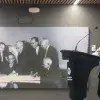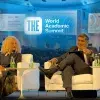In the context of a new government in Mexico and elections in the United States, the present brings new challenges to the global agenda, agreed the participants at the forum “Mexico and International Security.”
According to Gabriel Aguilera, Regional Dean of the School of Social Sciences and Government, while it is true that this is a time of important changes, it also presents unique opportunities for the country.
“International security issues occupy a prominent place in the political and media discussion (...) This implies adopting a broader view,” said Edna Jaime, National Dean of the ECSG.
“If what we’re looking for is hope, perhaps that’s where we’ll find it (...) from the voices of these people, whose perspectives could be heard and applied in the country’s strategy and planning for the future,” Aguilera said.
The second edition of this forum, held at Tec de Monterrey, brought together academics, decision makers, opinion leaders, and specialists.
International security through a Mexican lens
At the opening ceremony, Jaime was accompanied by Hans Blomeier, Director of the Konrad Adenauer Foundation in Mexico, and Christian Ehrlich, Director of the Institute for Strategy and Defense Research (ISDR).
During the forum’s inauguration, the Dean highlighted the collaboration between Tec de Monterrey, the Konrad Adenauer Foundation in Mexico, and the Institute for Strategy & Defense Research as coordinators of the meeting.
“It’s very important that we make an effort to understand the international security issue from a Mexican perspective,” Jaime said.
Blomeier said that, in addition to the vision shared by Aguilar, a distinctive feature of this edition was its ability to bring together speakers who, in addition to opening dialogue among diverse age groups, also highlighted the role of marginalized issues and groups.
“This is an interdisciplinary dialogue between experts, but it’s also an intergenerational dialogue,” he said.
Christian Ehrlich, a Tec graduate in Political Science, concluded by pointing out that since we are living in the era of the “end” of certainties, it is the responsibility of all of us as a society to build new ones, starting from the present.
“This is an interdisciplinary dialogue of experts, but it’s also an intergenerational dialogue”.- Hans Blomeier
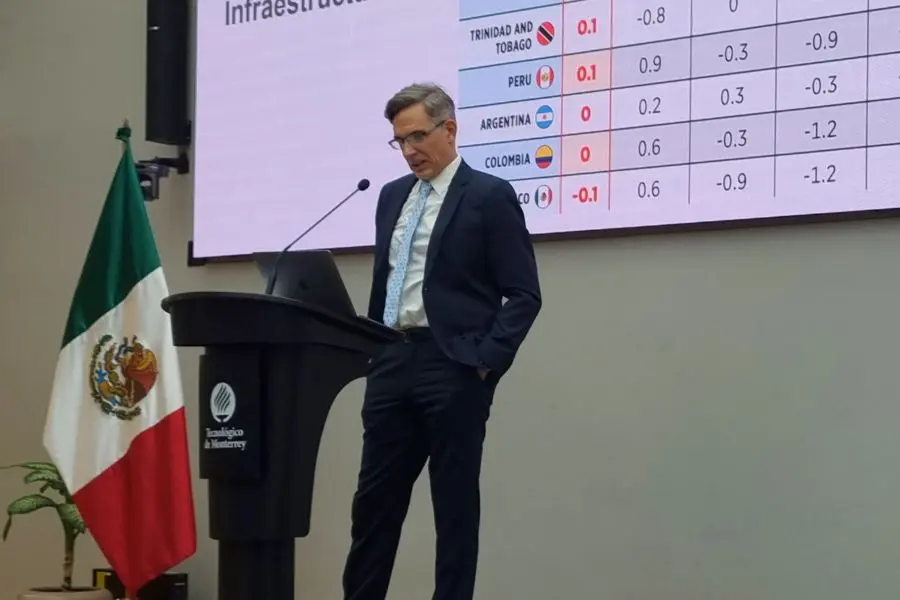
Approaching security from an economic perspective
During the International Political Economy panel, Faculty of Excellence professor Sebastian Mazzuca was joined by Monterrey campus research professor Mariana Rangel, along with the Regional Dean.
“Beyond sharing a thesis with you, this is a provocation,” Mazzuca said, challenging both his colleagues and the audience, explaining how the global security and economic landscape bring major geopolitical changes.
“Countries have expired as geographical units because of two key problems, their scale and their combinations (...) And what will follow them? We’re already looking at a proposal for city networks,” the professor said.
For her part, Rangel pointed out the role of the Mexican economy within the current global scenario and its conflicts, pointing out the stagnation the country has experienced, alongside the unequal flow of foreign investment and lack of alliances.
“I see two strategies that Mexico can take, one through the intervention and development of key sectors such as clean energy and pharmaceuticals, and the other through alliances and models such as friendshoring,” she said.
Friendshoring is an economic and geopolitical strategy in which a country decides to move its manufacturing, production, or supply chain operations to allied countries.
Aguilera also pointed out the importance of adopting a new viewpoint to address international security, noting that a country’s wealth is not necessarily equivalent to its power.
On the cusp of the advent of a new world order
Security (CISS) at the Bundeswehr University of Munich, affirmed the current transition to a new international landscape.
“We’re in the midst of a battle for a new world order, but it’s not a fight between democracies and autocracies but between the status quo countries or powers and the revisionists,” he said.
The academic pointed out that although there are experts who foresee a new multipolar configuration of the international system, he sees the arrival of a bipolar order (China and the US) or a unipolar one (the US) as more feasible.
Masala also explained how the concept of power has evolved beyond arms races and military power. People now talk about geopolitical control of markets and technological innovation.
“This gives more room for regional leaders to exist, particularly emerging markets such as Mexico and Brazil, even within a uni- or bipolar world” he said on the panel International Security: Chaos and Uncertainty.
Finally, the specialist reflected on the role of globalization, expressing the current debate between the benefits of openness that compete with the generation of dependency ties.
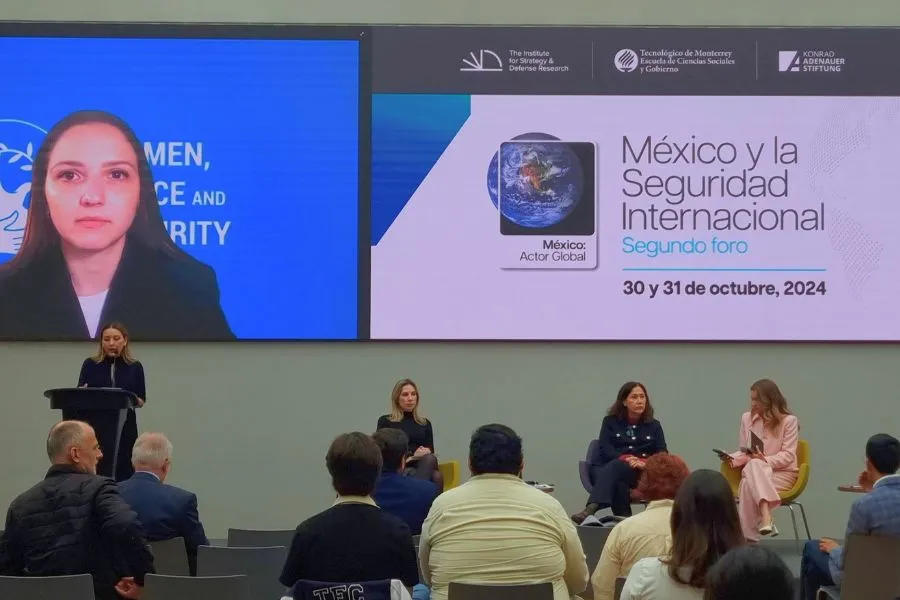
Multidimensional security with a gender perspective
On the Women and International Security panel, moderator Giovanna Villalobos from ISDR Mexico opened the discussion on the global security agenda from and for women.
This panel included Sandra Sandu, from the Konrad Adenauer Foundation in Moldova; Isabella Cota, investigative journalist at El País; and Magdalena Alcocer, Graduate Coordinator at Anáhuac University.
To mark the 24th anniversary of the UN Women, Peace, and Security Agenda, the panelists highlighted how conflicts affect women differently with asymmetrical impacts.
“We have to remember that women’s work and lives are just as valuable as men’s,” said Cota, stressing the need for local legislation that protects women on multiple fronts.
Both Alcocer and Sandu emphasized the role of civil society as mediators and “watchdogs” for the fulfillment of the peace agenda that concerns both the protection of women and their development.
“(From civil society) we can shape, monitor, and sustain national policies related to security and see that they empower women and protect our society,” Sandu said.
North America, crisis, and opportunities for the region
For academic Raúl Benítez, research professor at the National Autonomous University of Mexico (UNAM), the North American region can be understood as the economies of three countries: the US, Mexico, and Canada, linked by large differences that separate them.
“In security matters, both Canada and the United States give priority to the global, while Mexico has a paralyzing and ambiguous discourse,” said the professor.
“We need to assume responsibilities according to the size of the country we are,” he said.
In defense, Benítez clarified that there is currently no tri-national agenda, but two binational ones with the US acting as the “center” of both strategies, one based on the Northern Command and the other restricted to drug trafficking.
“Being well located geographically and commercially is a necessary but insufficient condition for the country. We need to build an internal policy of consensus in accordance with global conflict and our location,” he concluded.
Among wars and alliances, the future of the European region
Robert Papp, Regional Director of the Tec’s Department of Political Science and International Relations, joined Carlo Masala to discuss the future of the European bloc in a landscape of armed conflict.
With Blomeier serving as moderator, the professors expressed a shared concern about the apparent rise of populism and extreme right-wing parties on the continent, generating internal divisions.
“We’re returning to a scenario more like that of the last century, in which European integration is primarily about a common market, not a political or judicial unity,” Masala said.
For his part, Papp expressed his concern about the return of armed conflicts in the region, particularly the war in Ukraine, which could completely change Europe if it escalates.
“It only takes one misdirected missile or provocation from the Balkans to Russia to escalate the conflict to a level we haven’t witnessed yet,” the Director said.
Papp also pointed out how European identity and growing nationalism in certain countries can hinder the cooperation process, which Masala believes will require a re-evaluation by the region’s stakeholders.
Reflection on the South American outlook and its influence
Patrick Paterson, Associate Dean at the National Defense University in Washington, D.C., and Oscar Palma, professor at the University of the Rosary in Colombia approached the South American scenario from two perspectives.
From Paterson’s perspective, climate change is the greatest security risk for the region due to the impact of issues such as global warming on the societies of this bloc.
“Small countries suffer greatly from the effects of emissions from more developed countries (...) It’s a transnational threat with no respect for borders,” the Dean said.
The effects of these problems in turn have an impact on vulnerable populations, resulting in an increase in forced migratory displacements, food security crises, among others.
For his part, Palma approached the South American bloc from the perspective of studying the case of Colombia as a NATO global partner and its implications in terms of regional security.
“Whether or not this is a threat to the region will really depend on the narratives constructed by the actors at political junctures (...) However, it must be understood that there are clear limits to this alliance,” he said.
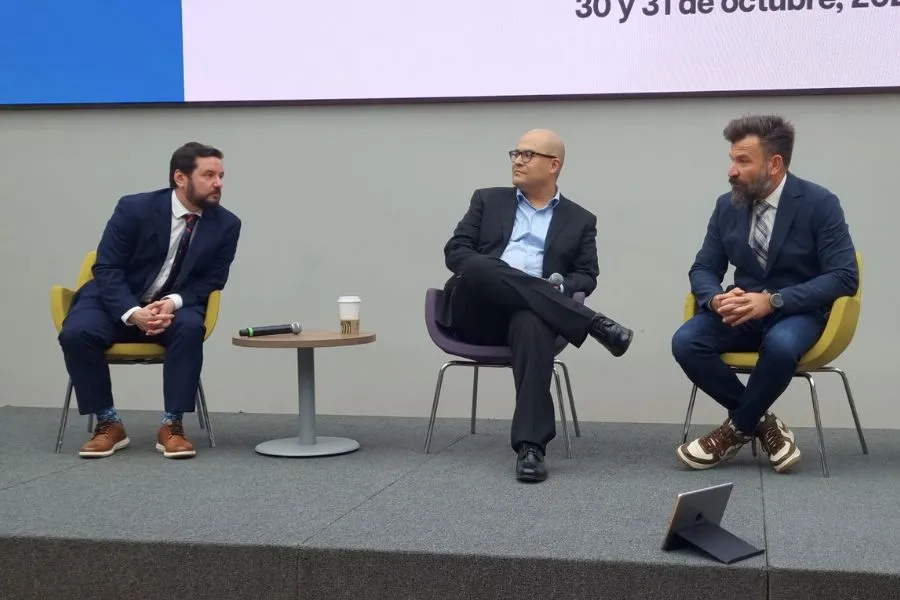
Defense industry nearshoring models
Emilio Cadena, General Director of Prodensa, moderated the panel on nearshoring, thinking specifically in terms of the military defense industry and focusing on the potential of emerging markets.
Íñigo Guevara, Director of Janes Strategic Services and professor at Georgetown University; and Roberto Durán, research professor at the Tec’s School of Government and Public Transformation, participated as speakers in this discussion.
“In terms of manufacturing and being able to count on defense technology, it’s not only acquiring this equipment, but producing it locally,” said Guevara.
“The world is subject to forces beyond the economic, political, environmental, etc. that can disrupt trade patterns (...) After the pandemic, we realized that borders do matter,” Durán added.
The latter identified four integration models that can be explored in the new global landscape, the first being reshoring, the second nearshoring, the third allyshoring and, finally, replication.
As part of this line of thought, the expert sees potential in the ally or friendshoring model, which in turn seeks to create strategic alliances based on common ideologies and values.
The 2024 International Security Forum
Mexico and International Security is the second edition of this roundtable discussion among more than 15 academic specialists, decision makers, and more on the exploration of the topic beyond the absence of war.
According to Aguilera, Tec de Monterrey’s School of Social Sciences and Government is proud to be part of this advocacy and to host the event, adding to the discussion from Mexico.
“It’s important to open up to a broader scope for understanding these issues with the support and voices from contexts that are different from our own and with a wide variety of perspectives,” said Aguilar.
The Dean points out how this diversity of topics and perspectives is the most relevant differentiator in this year’s forum, highlighting the participation of young people in these spaces.
“Talking from the perspective of and about the marginalized, such as young people and women, is fundamental, because we have to ask ourselves who has suffered the most as a result of the crisis of violence and wars, Aguilar said in an interview.
“These kinds of spaces help to understand how international security issues really impact populations in very tangible ways, and that’s something that concerns all of us,” he added.
The forum was held on October 30 and 31 in the Main Hall of the Rector’s Building on the Tec’s Monterrey campus.
YOU MAY ALSO BE INTERESTED IN:




